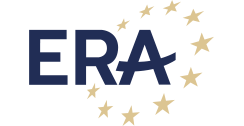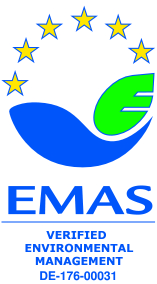21 December 2023
Farewell to John Coughlan

After 19 years, our Director of Corporate Communications, John, is moving on to new challenges. He joined ERA in 2004 as Press & Public Relations Officer and quickly rose through the ranks to become Head of the newly created Corporate Communications Department, which included the Marketing team, and a member of the Management Team. On his last day with us, he reflected on nearly two decades at the Academy.
The communications landscape has been transformed in the 19 years since I joined ERA. Back then, the only way to communicate with our target audience was via direct mail and the traditional media. Social networks did not yet exist. Now ERA communicates interactively with tens of thousands of practitioners of law every day. Social media allows us to reach audiences we would never have reached before. Yet many practitioners, especially among the judiciary, are deliberately not present on social media – at least in a professional capacity – so it is important that we maintain other channels to communicate with them as well. And while ERA’s main job is to train professionals on European law, it should also be concerned about how European law is perceived among the general population. Social networks have transformed the way in which ERA communicates with its target audience, but it is important that we do not get stuck in an echo chamber. We need to use all the channels through which practitioners of law and the general public learn about European law.
What has been your favourite part of the job?
There is an element of routine in any job but what has kept me going at ERA for 19 years has been the regular emergence of new challenges. I have really never been bored! Whether it has been external changes that require us to adapt and change – such as the Covid-19 pandemic – or new tasks that make us step back and take a longer perspective on the world in which we work – such as the studies we produced for the European Commission and European Parliament – there has been no room for complacency. We have internalised this attitude in our strategic planning process, working on a new development strategy every seven years, which is distilled into annual action plans. It means that we are constantly questioning what we are doing and seeking to improve it. That keeps us on our toes. I am honoured to have played a role in embedding this process in ERA’s DNA
Can you tell us more about your future plans? Is there a life after ERA?
I hope so! Yes, in fact I will hit the ground running in my new job as it is one I have already been performing in a voluntary capacity. I will serve as Secretary General of the International Cerebral Palsy Society and the Cerebral Palsy European Union Association. CP is the most common form of childhood-onset physical disability, affecting an estimated 17 million people around the world. My own son is one of those. He has a form known as spastic quadriplegia, meaning that all four limbs are affected and he has to use a wheelchair. Many people who know ERA have met my son over the years as he has attended congresses, receptions and other events, so it will not come as a surprise that I have decided to dedicate myself full-time to improving the representation of this underserved group at European and global levels.
What skills or experience do you think will be useful in your future endeavours?
While it may seem that I am moving from one world to another, there are in fact many ways in which I will use the skills and experience gained at ERA in my new position. Communication is of course very important, and raising the visibility of this poorly understood disability will be key to improving conditions for people with CP. Understanding how to influence policy at the highest levels will also be critical, and I have already been active this year at both the European Union and the World Health Organization. Fundraising will of course be essential to this, and the experience gained at ERA – in particular in obtaining EU funding – will prove invaluable. And, as I already did this year, I will be coming back every year to participate in ERA’s Annual Conference on the Rights of Persons with Disabilities!
What has been your favourite part of the job?
There is an element of routine in any job but what has kept me going at ERA for 19 years has been the regular emergence of new challenges. I have really never been bored! Whether it has been external changes that require us to adapt and change – such as the Covid-19 pandemic – or new tasks that make us step back and take a longer perspective on the world in which we work – such as the studies we produced for the European Commission and European Parliament – there has been no room for complacency. We have internalised this attitude in our strategic planning process, working on a new development strategy every seven years, which is distilled into annual action plans. It means that we are constantly questioning what we are doing and seeking to improve it. That keeps us on our toes. I am honoured to have played a role in embedding this process in ERA’s DNA
Can you tell us more about your future plans? Is there a life after ERA?
I hope so! Yes, in fact I will hit the ground running in my new job as it is one I have already been performing in a voluntary capacity. I will serve as Secretary General of the International Cerebral Palsy Society and the Cerebral Palsy European Union Association. CP is the most common form of childhood-onset physical disability, affecting an estimated 17 million people around the world. My own son is one of those. He has a form known as spastic quadriplegia, meaning that all four limbs are affected and he has to use a wheelchair. Many people who know ERA have met my son over the years as he has attended congresses, receptions and other events, so it will not come as a surprise that I have decided to dedicate myself full-time to improving the representation of this underserved group at European and global levels.
What skills or experience do you think will be useful in your future endeavours?
While it may seem that I am moving from one world to another, there are in fact many ways in which I will use the skills and experience gained at ERA in my new position. Communication is of course very important, and raising the visibility of this poorly understood disability will be key to improving conditions for people with CP. Understanding how to influence policy at the highest levels will also be critical, and I have already been active this year at both the European Union and the World Health Organization. Fundraising will of course be essential to this, and the experience gained at ERA – in particular in obtaining EU funding – will prove invaluable. And, as I already did this year, I will be coming back every year to participate in ERA’s Annual Conference on the Rights of Persons with Disabilities!
Tell us about a memorable experience.
My time at ERA has been filled with memorable experiences, but some of the most lasting relate to trips that we made to mark the accession of new Member States to the ERA Foundation. Whether it be a rooftop reception overlooking the People’s Palace in Bucharest, the plush salons of the Ministry of Justice on Paris’ Place Vendôme or the grand halls of Edinburgh Castle, these were not just memorable photo opportunities, but an occasion to meet practitioners and training providers at national level and to understand better their needs and expectations. When you work internationally, it is important not to stay locked up in your ivory tower, but to go out and meet the people you are supposed to serve. I am looking forward to this aspect of my new job too, getting to know better the reality for persons with disabilities around the globe and the wonderful work that is being done to help them.
What makes ERA a unique place to work?
ERA is rightly proud to be regarded as a family-friendly employer and, as I take this step, I would like to thank ERA and especially the former director Wolfgang Heusel for all the support and flexibility they provided to me over the years, enabling me to take the time needed to accompany my son’s development. That might not make ERA unique, but it is very special.
He will be greatly missed by his team and everyone else at ERA and we wish him the best of luck for his new position.







